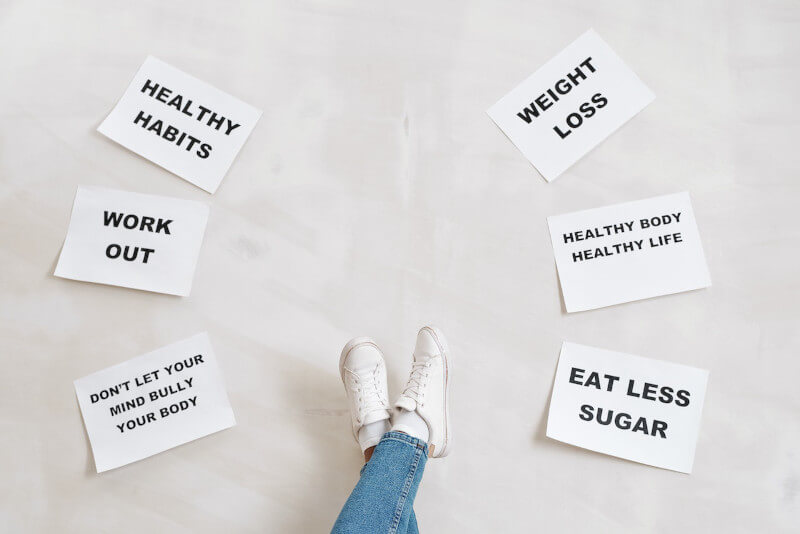Mental health conditions, such as anxiety and depression, are typically treated initially with psychotherapy and medication. However, the modifiable aspects of our daily lives that affect how we feel mentally are rarely brought up in conversations. People who are already doing well emotionally, mentally, and behaviourally may still be on the lookout for ways to enhance their well-being.
Making progress in one’s life can be a liberating experience. Some individuals might be unable to start making such adjustments due to lack of time or money, but we all have the authority to change things that matter. For starters, consider these five adjustments to your daily routine:
Change Your Eating Habits and Get Active
Nutrients crucial for healthy brain function can be found in whole foods like dark green veggies, beans, whole grain products, fish, and lean protein. These foods provide vital nutrients like magnesium, folate, zinc, and omega-3 fatty acids. Some polyphenol-rich foods, like berries, tea, dark chocolate, wine, and certain herbs, are also beneficial to brain health and function.

Swimming, walking or running, weight lifting, and participating in sports are just a few examples of the many forms of physical activity that can be advantageous. Taking a quick walk or doing some energetic house chores are both good ways to start moving more. Additional benefits to mental health may result from engaging in activities that also provide opportunities for connection with others and with the natural world. According to physical activity recommendations, most days of the week should include at least thirty minutes of light exercise (about 150 minutes total over the week). However, even brief physical exertion can have a noticeable effect on one’s mood.
Take a break
Isolating yourself occasionally allows you to recharge your mental batteries and prepare for the future. The ability to reflect internally and adapt to adversity is a byproduct of introspection. Sometimes it’s good to take a break from technology and social media. Focus on your accomplishments or aspirations as you take in the beauty of your surroundings.
Cut Back on Your Bad Habits
The prevention and treatment of alcoholism and other substance abuse problems is a no-brainer from a medical perspective. Those who struggle with substance abuse are at a much higher risk for developing mental illness and experience much worse health outcomes as a result. There is some evidence that moderate alcohol consumption (especially wine) can help protect against depression. But other recent research has shown that moderate alcohol consumption has no positive effects on cognitive performance.
Nicotine addicts are continuously at the discretion of a withdrawal-craving cycle, which has profound effects on their mood, so quitting smoking is also crucial. Alleviate withdrawal symptoms, it may take a while, but eventually, your brain chemistry will adjust. Happier and less anxious people tend to be former smokers.
Give Sleep and Rest a High Priority
Effective sleep hygiene practises can aid in the treatment of insomnia. Some of these include reducing your caffeine intake, cutting down on your time in bed (by setting a regular bedtime and sticking to it), and maintaining a regular wake-up time. We should ideally have some leeway in this regard because some people are naturally predisposed to being either morning or evening individuals (particularly with work schedules).
If you’ve been lying in bed for 20 minutes and still can’t fall asleep, it’s usually better to get up and do something mentally stimulating (with as little light and noise as possible) until you’re sleepy. One of the most important things you can do to ensure a restful night’s sleep is to limit your use of electronic devices in the hours leading up to bedtime, particularly those that emit blue light.
The sleep-inducing hormone melatonin will be secreted in greater amounts as a result. Managing stress requires making time for rest and fun activities. Physically demanding hobbies, like running, have been shown to have a beneficial impact on one’s mental wellness. This site offers insights into the complex nature of anxiety disorders and here is the official anxiety blog in South Africa.
Make a Plan to Manage Your Stress
The mental health of an individual is negatively impacted by prolonged stress. The effects of mental illness are made worse by this. Meditation is one technique that can be used to manage stress. Stress can be reduced and mental toughness can be boosted with as little as 30 minutes of daily meditation practise. Yoga is not only an excellent method for relieving stress, but also a highly effective physical practise. It has the potential to improve one’s viewpoint and maintain one’s interest in the world.
Nature Time

A lot of us feel better whenever the sun is out. Exposed to sufficient sunlight, serotonin levels are raised. It increases levels of vitamin D, which affect our psychological well-being, and it aids in regulating our sleep-wake cycle at just the right time. Consider the suggestions for sunlight exposure according to the period of day or year and the colour of the skin to strike a balance between the advantages of sunlight exposure and the threat of melanoma.
You should also consider reducing your excessive use of electronic media like smartphones, computers, and televisions, as well as toxins, chemical products, and environmental contaminants such as “noise” pollution.
Time Spent in Natural Settings Can Help Alleviate These Symptoms
Spending time in natural settings has been shown to boost confidence and happiness. Forest bathing, the practise of spending quality time in a forest, is used to treat mental health issues in some Asian countries. The beneficial effect of animal life is a logical outgrowth of the benefits we experience when we spend time with plant life. Pet ownership has been shown to have numerous benefits, and animal-assisted therapy (using animals like horses, cats, dogs, and now even dolphins) may further enhance a person’s sense of well-being.
Ask for Aid When You’re in Trouble
Making meaningful progress in one’s lifestyle is not intended to be a substitute for conventional medical care or psychotherapeutic intervention, but rather as an additional, self-directed measure. Even though many alterations to one’s way of life can be beneficial, some (like minimising junk food, liquor, or quitting smoking) can prove difficult if they are relied on as a sort of psychological support system. They could require careful handling and expert assistance.

Stringent recommendations promoting sobriety, or a strict diet or workout routine, may cause additional suffering and may lead to feelings of guilt if the goals aren’t met. Be gentle with yourself. That being said, think about how your mind feels after you’ve had a healthy, whole-food meal, gotten a good night’s sleep (without alcohol), or taken a walk in the great outdoors with a friend. Maintaining a regular sleep-wake schedule, avoiding large meals before bed, and exercising regularly are all important factors in ensuring a healthy lifestyle. It’s also a good idea to cut down on late-night activities like watching too many movies if they keep you up.
Maintain a Diary
Writing down your thoughts and emotions is a wholesome method of expressing yourself and managing anxiety. Get in the habit of writing in a diary and utilize it to reflect on what sets you off. You can refer back to it every so often to remind yourself of your accomplishments and thereby sustain your motivation.
